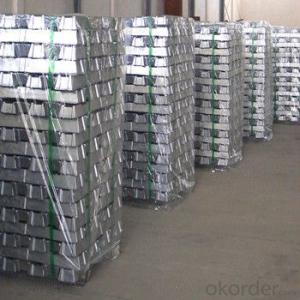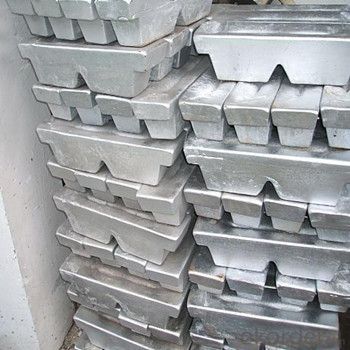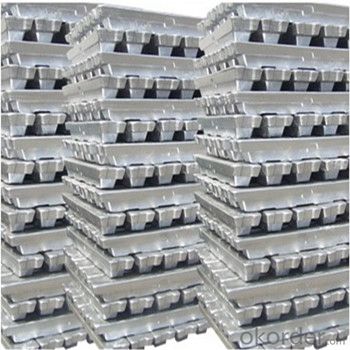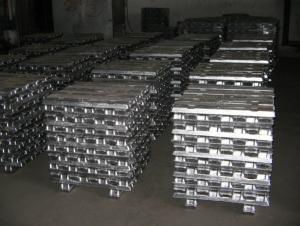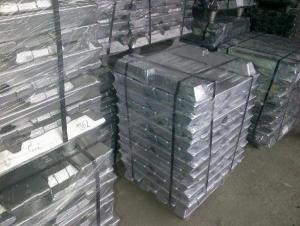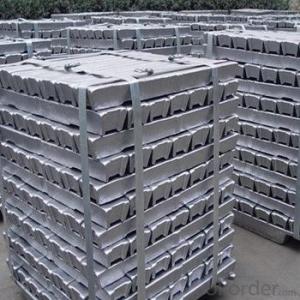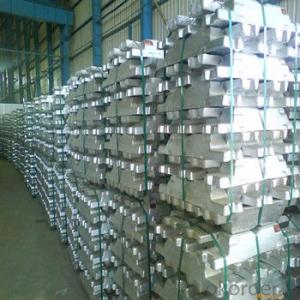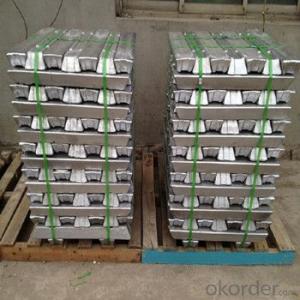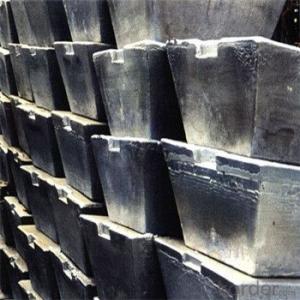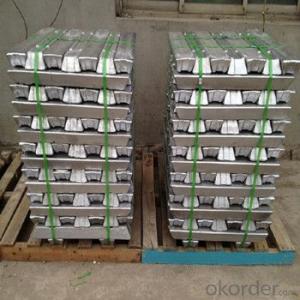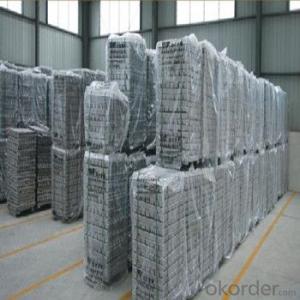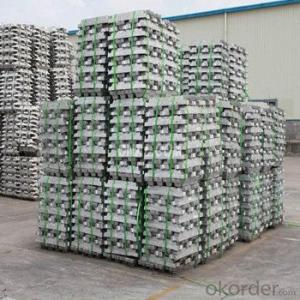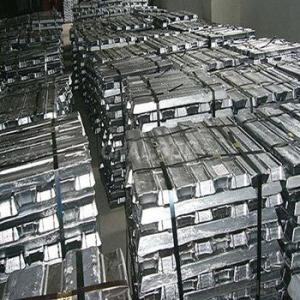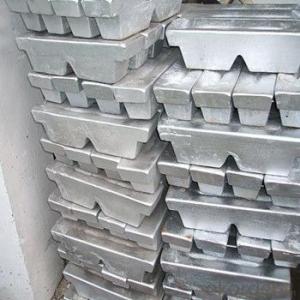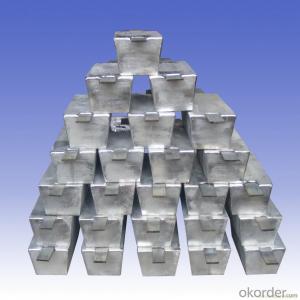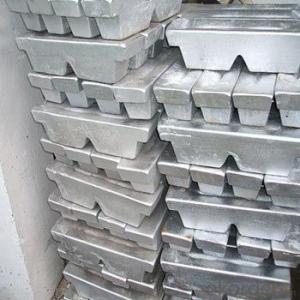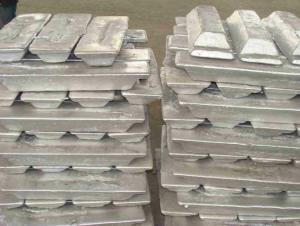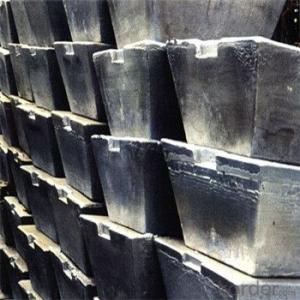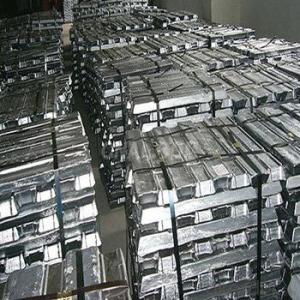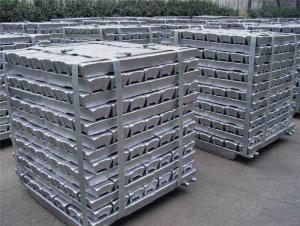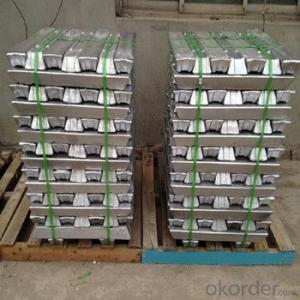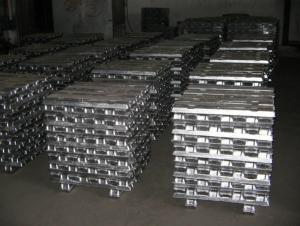Aluminum Ingot 99.7 From Factory Wholesale Pure
- Loading Port:
- China main port
- Payment Terms:
- TT OR LC
- Min Order Qty:
- 1000 m.t.
- Supply Capability:
- 10000 m.t./month
OKorder Service Pledge
OKorder Financial Service
You Might Also Like
Pure Aluminum Ingot Used for Industry
1.Structure of Aluminum Ingot Description
A material that has been cast into a shape in order to be transported and processed easier than in an unprocessed form. An ingot is typically rectangular in shape, which allows it to be stacked. Ingots are most commonly associated with metals, with ingots of gold held in the vaults of banks and brokerages being popular images.
2.Main Features of the Aluminum Ingot
•High Purity
•High strength
•Fast melting
•Best price
•Good after-service
3. Aluminum Ingot Images
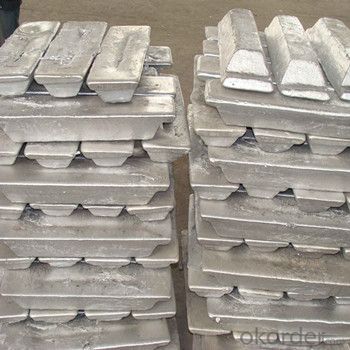
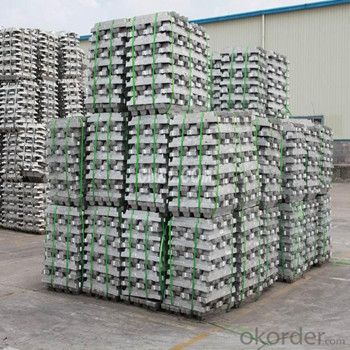
4. Aluminum Ingot Specification
Grade | Chemical Composition % | |||||||||
Al≥ | impurities ≤ | |||||||||
Si | Fe | Cu | Ga | Mg | Zn | Mn | others | Sum | ||
Al99.9 | 99.90 | 0.50 | 0.07 | 0.005 | 0.02 | 0.01 | 0.025 | - | 0.010 | 0.10 |
Al99.85 | 99.85 | 0.80 | 0.12 | 0.005 | 0.03 | 0.02 | 0.030 | - | 0.015 | 0.15 |
Al99.7 | 99.70 | 0.10 | 0.20 | 0.010 | 0.03 | 0.02 | 0.030 | - | 0.030 | 0.30 |
Al99.6 | 99.60 | 0.16 | 0.25 | 0.010 | 0.03 | 0.03 | 0.030 | - | 0.030 | 0.40 |
Al99.5 | 99.50 | 0.22 | 0.30 | 0.020 | 0.03 | 0.05 | 0.050 | - | 0.030 | 0.50 |
Al99.00 | 99.00 | 0.42 | 0.50 | 0.020 | 0.03 | 0.05 | 0.050 | - | 0.050 | 1.00 |
5.FAQ of Aluminum Ingot
We have organized several common questions for our clients,may help you sincerely:
①How about your company?
A world class manufacturer & supplier of castings forging in carbon steel and alloy steel,is one of the large-scale professional investment casting production bases in China,consisting of both casting foundry forging and machining factory. Annually more than 8000 tons Precision casting and forging parts are exported to markets in Europe,America and Japan. OEM casting and forging service available according to customer’s requirements.
②How to guarantee the quality of the products?
We have established the international advanced quality management system,every link from raw material to final product we have strict quality test;We resolutely put an end to unqualified products flowing into the market. At the same time, we will provide necessary follow-up service assurance.
③How long can we receive the product after purchase?
In the purchase of product within three working days, We will arrange the factory delivery as soon as possible. The pecific time of receiving is related to the state and position of customers.Commonly 7 to 10 working days can be served.
- Q: What are the different coating processes for aluminum ingots?
- There are several different coating processes for aluminum ingots, including anodizing, powder coating, electroplating, and chemical conversion coating.
- Q: What are the dimensions of a typical aluminum ingot?
- The dimensions of an average aluminum ingot may differ depending on the specific industry and application it is being used for. However, a widely accepted standard measurement for aluminum ingots is roughly 20 inches (50 centimeters) in length, 6 inches (15 centimeters) in width, and 2 inches (5 centimeters) in thickness. These measurements are not set in stone and can be adjusted according to the customer's requirements or the particular production process. Moreover, there is a wide range of other sizes and shapes of aluminum ingots available in the market, catering to specialized applications with smaller ingots and fulfilling industrial purposes with larger ones.
- Q: How are aluminum ingots used in the production of lighting fixtures?
- Aluminum ingots are used in the production of lighting fixtures as they serve as the primary material for constructing the fixtures' bodies and frames. The ingots are melted down and then cast into various shapes and sizes, allowing manufacturers to create durable and lightweight components for the fixtures. Additionally, the aluminum's excellent thermal conductivity helps dissipate heat efficiently, making it a suitable material for light fixtures that require effective heat management.
- Q: Aluminum is pure aluminum expensive, or aluminum alloy expensive, aluminum ingot expensive, aluminum just expensive
- Processing flow of aluminum alloy1: aluminum ingot (the kind of box)2: aluminum rod (aluminum ingot produced by melting)
- Q: What is the current market price of aluminum ingots?
- The current market price of aluminum ingots is subject to change and may vary depending on factors such as supply and demand, global economic conditions, and market fluctuations. To obtain the most accurate and up-to-date information on the current market price of aluminum ingots, it is recommended to consult reputable financial news platforms, commodity exchanges, or industry reports.
- Q: Production process of aluminium ingot
- In the world has proven reserves of bauxite, 92% is weathering lateritic bauxite, belonging to gibbsite type bauxite. The characteristics of these is low silicon, high iron and high silicon aluminum ratio, concentrated in West Africa, Oceania and central and South america. The remaining 8% are sedimentary type bauxite, belong to diaspore and diaspore type, low grade, mainly in Greece, the former Yugoslavia and Hungary and other places.
- Q: Is it harmful to the human body to refine ingots from waste capacitors?
- (the electrolyte in the battery is strong sulfuric acid) and whether it causes sterility depends on the composition of the electrolyte. The working electrolyte has three components
- Q: What are the limitations of using aluminum ingots in high-temperature applications?
- Using aluminum ingots in high-temperature applications comes with several limitations. Firstly, aluminum's melting point is relatively low, around 660 degrees Celsius. This means it may not be able to withstand the extremely high temperatures commonly found in industrial processes or aerospace applications. When exposed to such elevated temperatures, aluminum tends to soften and lose its mechanical strength, compromising the integrity and functionality of the component or structure. Secondly, aluminum has a high coefficient of thermal expansion, causing it to expand significantly when exposed to heat. This expansion can result in dimensional instability and issues like warping or distortion, especially during rapid or uneven heating and cooling cycles. These changes in dimensions can affect the accuracy of the final product, necessitating additional measures to compensate for the thermal expansion. Additionally, aluminum has relatively poor resistance to oxidation at high temperatures. When exposed to oxygen at elevated temperatures, aluminum can form a thin layer of aluminum oxide, which acts as a protective barrier against further oxidation. However, at extremely high temperatures, this layer can break down, making aluminum more susceptible to oxidation and corrosion. This can lead to a decrease in the strength and durability of the aluminum component. Lastly, aluminum has lower strength compared to materials like steel or titanium. Although aluminum alloys can be developed to enhance their strength, they may still not be suitable for applications requiring exceptional strength at high temperatures. In situations where high mechanical strength is crucial, alternative materials with superior high-temperature strength properties may be more suitable. In conclusion, the limitations of using aluminum ingots in high-temperature applications include their low melting point, high coefficient of thermal expansion, susceptibility to oxidation, and relatively low strength. These factors must be carefully considered when selecting materials for high-temperature applications to ensure the desired performance and reliability of the components or structures.
- Q: Can aluminum ingots be recycled?
- Yes, aluminum ingots can be recycled.
- Q: What are the challenges in sourcing sustainable aluminum ingots?
- One of the challenges in sourcing sustainable aluminum ingots is ensuring a transparent and traceable supply chain. It can be difficult to verify the sustainability claims made by suppliers and ensure that they are adhering to environmentally-friendly practices throughout the production process. Additionally, there may be limited availability of sustainable aluminum ingots, as the demand for such products may exceed the current supply. Finally, the cost of sourcing sustainable aluminum ingots can be higher compared to conventional options, which can pose a financial challenge for businesses.
Send your message to us
Aluminum Ingot 99.7 From Factory Wholesale Pure
- Loading Port:
- China main port
- Payment Terms:
- TT OR LC
- Min Order Qty:
- 1000 m.t.
- Supply Capability:
- 10000 m.t./month
OKorder Service Pledge
OKorder Financial Service
Similar products
Hot products
Hot Searches
Related keywords
